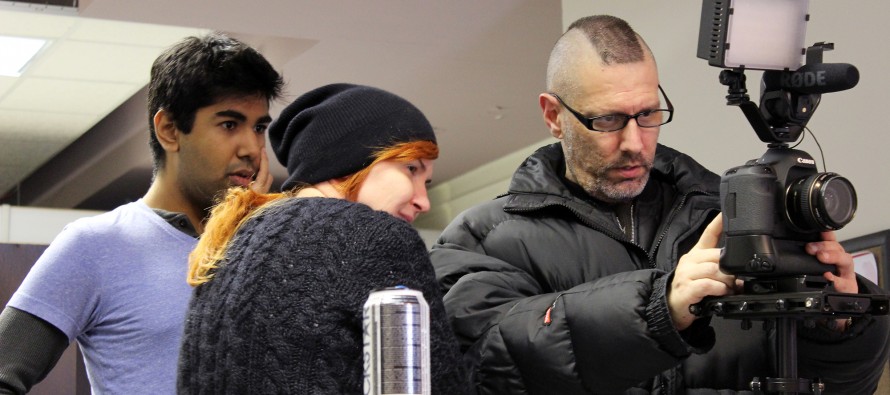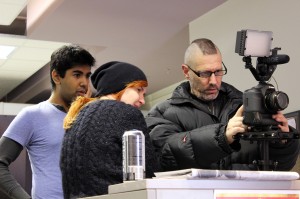Local filmmakers compete in short film competition


Local filmmakers J.D. Oppen (right), Swjetlana Oppen and Brian Khan look over footage from an earlier scene for their film submission Oct. 19. The 48-Hour FlickFest required teams to write, shoot and edit a film in two days across the region as part of the Windsor International Film Festival. (Photo by/Justin Prince)
By Justin Prince
Aspiring filmmakers were demonstrating their talents at a short film competition Oct. 18-20 in Windsor.
The seventh annual 48-Hour FlickFest was held as part of the Windsor International Film Festival. The goal of the FlickFest was to write, shoot and edit a film – four minutes in length – within two days. Each crew had to include a specific line of dialogue, a prop and a certain element or theme to meet the competition’s standards.
“I think (the FlickFest) is an outlet for the filmmaking community. There are not too many things that really happen here,” said 27-year-old event director Eric Boucher. “Of course people make films here and they’ll have premieres or promote it in some way and get it seen, but in terms of doing something to keep people doing what they’re doing, this seems to be that kind of thing.”
This year’s FlickFest required each team to use a line of dialogue saying “This city has a heart of gold.” Each film also required the use of a local newspaper and had to include a certain element into their film. These elements included using found footage and audio from someone else, doing an interview with the director or to break a traditional rule in filmmaking.
Boucher competed in the first two FlickFests while in school before running the event for the past three years. He said when the event started there weren’t as many groups, but in the 2012 FlickFest, there were 25 teams. The 2013 event had 16 teams.
“There’s never been a bad film that’s been entered or something we can’t show,” said Boucher. “People take this seriously and have fun with it.”
J.D. Oppen, who was competing in the event for the first time, works for the WIFF as a sound engineer. Oppen, 49, does the sound at the Capitol Theatre for all WIFF events year-round and owns a production company in Windsor. He said going to The Specs Howard School for film production helped him in terms of filming, but he already learned a great deal about filmmaking before going to school.
“It’s so easy for anybody to pick up a video camera they’re so readily available now and to go shoot and what not, but I think education can play a big part because it does teach you a lot of things that you might not learn on your own,” said Oppen. “But that’s not to say you can’t pick up a camera and learn great things. I was shooting for a long time beforehand.”
Drew Hewitt, a student at Mohawk College studying library information technology, said he found out about the FlickFest when he went to the WIFF in 2007. Hewitt, 25, said he started doing short films when he attended Kennedy Collegiate high school, where he took a class on film production. He bought a laptop and a camera to make his films and it soon became a hobby.
“I usually try and shoot short films in (the timeframe of the competition) and as quickly as possible because I don’t use people who are mainly actors,” said Hewitt. “I have to work around people’s schedules, so it kind of taught me film a lot in a short amount of time.”
Hewitt’s original film took a day to make before he got a call from one of his crew members saying they couldn’t make it. Hewitt had to rewrite his entire movie and come up with a new plot. He said it took him three hours to make his new film.
“You’re always going to run into little hitches because you’re trying to manage a lot of people who aren’t always on the same page as you,” said Hewitt. “So when you get such a short timeframe, you really have to be versatile and willing to adapt in any situation.”
The 48-Hour FlickFest’s submissions will premiere Nov. 3 at the Capitol Theatre with awards for each film to be given out immediately after.


